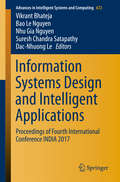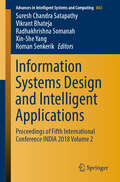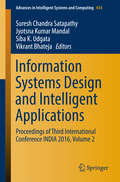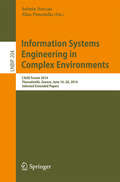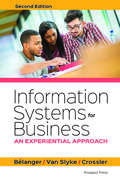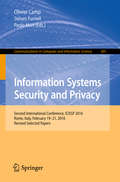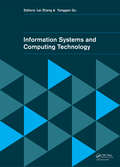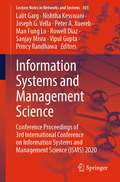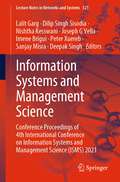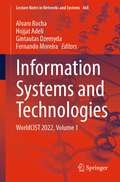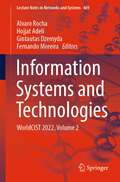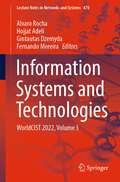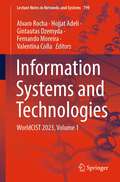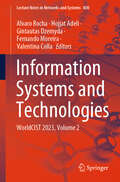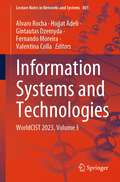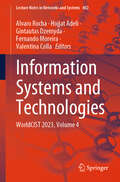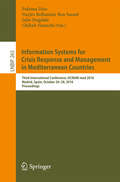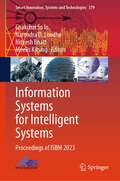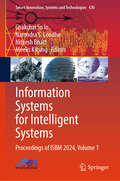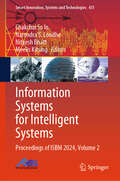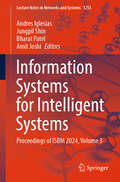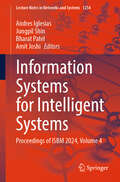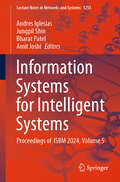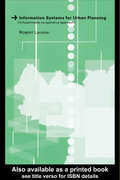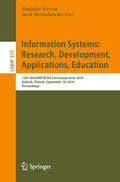- Table View
- List View
Information Systems Design and Intelligent Applications: Proceedings Of Fourth International Conference India 2017 (Advances In Intelligent Systems And Computing #672)
by Suresh Chandra Satapathy Vikrant Bhateja Bao Le Nguyen Nhu Gia Nguyen Dac-Nhuong LeThe book is a collection of high-quality peer-reviewed research papers presented at International Conference on Information System Design and Intelligent Applications (INDIA 2017) held at Duy Tan University, Da Nang, Vietnam during 15-17 June 2017. The book covers a wide range of topics of computer science and information technology discipline ranging from image processing, database application, data mining, grid and cloud computing, bioinformatics and many others. The various intelligent tools like swarm intelligence, artificial intelligence, evolutionary algorithms, bio-inspired algorithms have been well applied in different domains for solving various challenging problems.
Information Systems Design and Intelligent Applications: Proceedings of Fifth International Conference INDIA 2018 Volume 2 (Communications in Computer and Information Science #863)
by Xin-She Yang Roman Senkerik Suresh Chandra Satapathy Vikrant Bhateja Radhakhrishna SomanahThe book gathers a collection of high-quality peer-reviewed research papers presented at the International Conference on Information System Design and Intelligent Applications (INDIA 2018), which was held at the Universite des Mascareignes, Mauritius from July 19 to 21, 2018. It covers a wide range of topics in computer science and information technology, from image processing, database applications and data mining, to grid and cloud computing, bioinformatics and many more. The intelligent tools discussed, e.g. swarm intelligence, artificial intelligence, evolutionary algorithms, and bio-inspired algorithms, are currently being applied to solve challenging problems in various domains.
Information Systems Design and Intelligent Applications: Proceedings of Third International Conference INDIA 2016, Volume 2 (Advances in Intelligent Systems and Computing #434)
by Suresh Chandra Satapathy Jyotsna Kumar Mandal Vikrant Bhateja Siba K. UdgataThe third international conference on INformation Systems Design and Intelligent Applications (INDIA – 2016) held in Visakhapatnam, India during January 8-9, 2016. The book covers all aspects of information system design, computer science and technology, general sciences, and educational research. Upon a double blind review process, a number of high quality papers are selected and collected in the book, which is composed of three different volumes, and covers a variety of topics, including natural language processing, artificial intelligence, security and privacy, communications, wireless and sensor networks, microelectronics, circuit and systems, machine learning, soft computing, mobile computing and applications, cloud computing, software engineering, graphics and image processing, rural engineering, e-commerce, e-governance, business computing, molecular computing, nano-computing, chemical computing, intelligent computing for GIS and remote sensing, bio-informatics and bio-computing. These fields are not only limited to computer researchers but also include mathematics, chemistry, biology, bio-chemistry, engineering, statistics, and all others in which computer techniques may assist.
Information Systems Engineering in Complex Environments
by Selmin Nurcan Elias PimenidisThis book constitutes the proceedings of the CAiSE Forum from the 26th International Conference on Advanced Information Systems Engineering, CAiSE 2014, held in Thessaloniki, Greece, June 2014. The CAiSE 2014 Forum was a place to present and discuss new ideas, emerging topics, and controversial positions, and to demonstrate innovative tools and systems related to information systems engineering. To this end, three types of submissions were invited: visionary papers presenting innovative research projects at an early stage, demo papers describing novel tools and prototypes; and case studies reporting industrial applications. The 17 papers in this volume were carefully reviewed and selected from 45 submissions and include 12 visionary papers, four demo papers, and one case study. The reworked and extended versions of the original presentations cover topics such as business process management, process mining, enterprise architecture and modeling, model-driven development, and requirements engineering.
Information Systems For Business: An Experiential Approach
by France Belanger Craig Slyke Robert CrosslerDesigned for the introductory MIS course, this text provides a learner-centered, experiential approach that helps engage students with in-class activities and productive discussions. This second edition is thoroughly revised and updated with new topics including Big Data, mobile application development, and Internet of Things.
Information Systems Security and Privacy
by Steven Furnell Olivier Camp Paolo MoriSlamming the door on security threats just got easier for IT professionals. This resource on security design and operations puts tools and techniques at their command, providing the expertise on things from access control to privacy enhancement.
Information Systems and Computing Technology
by Lei Zhang Yonggen GuInformation systems are complex, including data collecting, storing, processing and delivering. The main components of information systems are computer hardware and software, telecommunications, databases and data warehouses, human resources, and procedures. With the development of information systems, the innovation technologies and their applicat
Information Systems and Management Science: Conference Proceedings of 3rd International Conference on Information Systems and Management Science (ISMS) 2020 (Lecture Notes in Networks and Systems #303)
by Sanjay Misra Vipul Gupta Lalit Garg Nishtha Kesswani Joseph G. Vella Peter A. Xuereb Man Fung Lo Rowell Diaz Princy RandhawaThe book introduces concepts, principles, methods and procedures that will be valuable to students and scholars in thinking about existing organization systems, proposing new systems and working with management professionals in implementing new information systems. This book of Information Systems and Management Science (proceedings of ISMS 2020) is intended to be used as a reference by students and researchers who collect scientific and technical contributions with respect to models, tools, technologies and applications in the field of information systems and management science. This textbook shows how to exploit information systems in a technology-rich management field.
Information Systems and Management Science: Conference Proceedings of 4th International Conference on Information Systems and Management Science (ISMS) 2021 (Lecture Notes in Networks and Systems #521)
by Sanjay Misra Deepak Singh Lalit Garg Nishtha Kesswani Imene Brigui Dilip Singh Sisodia Joseph G Vella Peter XuerebThis multidisciplinary book delves into information systems’ concepts, principles, methods and procedures and their innovative applications in management science and other domains, including business, industry, health care and education. It will be valuable to students, researchers, academicians, developers, policymakers and managers thriving to improve their information and management systems, develop new strategies to solve complex problems and implement novel techniques to utilise the massive data best. This book of Information Systems and Management Science (proceedings of ISMS 2021) is intended to be used as a reference by scholars, scientists and practitioners who collect scientific and technical contributions concerning models, tools, technologies and applications in the field of information systems and management science. This book shows how to exploit information systems in a technology-rich management field.
Information Systems and Technologies: WorldCIST 2022, Volume 1 (Lecture Notes in Networks and Systems #468)
by Hojjat Adeli Gintautas Dzemyda Alvaro Rocha Fernando MoreiraThis book covers the following main topics: A) information and knowledge management; B) organizational models and information systems; C) software and systems modeling; D) software systems, architectures, applications and tools; E) multimedia systems and applications; F) computer networks, mobility and pervasive systems; G) intelligent and decision support systems; H) big data analytics and applications; I) human–computer interaction; J) ethics, computers and security; K) health informatics; L) information technologies in education; M) information technologies in radio communications; N) technologies for biomedical applications.This book is composed by a selection of articles from The 2022 World Conference on Information Systems and Technologies (WorldCIST'22), held between April 12 and 14, in Budva, Montenegro.WorldCIST is a global forum for researchers and practitioners to present and discuss recent results and innovations, current trends, professional experiences, and challenges of modern information systems and technologies research, together with their technological development and applications.
Information Systems and Technologies: WorldCIST 2022, Volume 2 (Lecture Notes in Networks and Systems #469)
by Hojjat Adeli Gintautas Dzemyda Alvaro Rocha Fernando MoreiraThis book covers the following main topics: A) information and knowledge management; B) organizational models and information systems; C) software and systems modeling; D) software systems, architectures, applications and tools; E) multimedia systems and applications; F) computer networks, mobility and pervasive systems; G) intelligent and decision support systems; H) big data analytics and applications; I) human–computer interaction; J) ethics, computers and security; K) health informatics; L) information technologies in education; M) information technologies in radio communications; N) technologies for biomedical applications.This book is composed by a selection of articles from The 2022 World Conference on Information Systems and Technologies (WorldCIST'22), held between April 12 and 14, in Budva, Montenegro.WorldCIST is a global forum for researchers and practitioners to present and discuss recent results and innovations, current trends, professional experiences, and challenges of modern information systems and technologies research, together with their technological development and applications.
Information Systems and Technologies: WorldCIST 2022, Volume 3 (Lecture Notes in Networks and Systems #470)
by Hojjat Adeli Gintautas Dzemyda Alvaro Rocha Fernando MoreiraThis book covers the following main topics: A) information and knowledge management; B) organizational models and information systems; C) software and systems modeling; D) software systems, architectures, applications and tools; E) multimedia systems and applications; F) computer networks, mobility and pervasive systems; G) intelligent and decision support systems; H) big data analytics and applications; I) human–computer interaction; J) ethics, computers and security; K) health informatics; L) information technologies in education; M) information technologies in radio communications; N) technologies for biomedical applications.This book is composed by a selection of articles from The 2022 World Conference on Information Systems and Technologies (WorldCIST'22), held between April 12 and 14, in Budva, Montenegro. WorldCIST is a global forum for researchers and practitioners to present and discuss recent results and innovations, current trends, professional experiences, and challenges of modern information systems and technologies research, together with their technological development and applications.
Information Systems and Technologies: WorldCIST 2023, Volume 1 (Lecture Notes in Networks and Systems #799)
by Hojjat Adeli Gintautas Dzemyda Alvaro Rocha Fernando Moreira Valentina CollaThis book is composed of a selection of articles from the 11st World Conference on Information Systems and Technologies, held between 4 and 5 of April 2023, at Sant'Anna School of Advanced Studies, in Pisa, Italy. WorldCIST is a global forum for researchers and practitioners to present and discuss recent results and innovations, current trends, professional experiences, and challenges of modern Information Systems and Technologies research, together with their technological development and applications. The main and distinctive topics covered are: A) Information and Knowledge Management; B) Organizational Models and Information Systems; C) Software and Systems Modeling; D) Software Systems, Architectures, Applications, and Tools; E) Multimedia Systems and Applications; F) Computer Networks, Mobility, and Pervasive Systems; G) Intelligent and Decision Support Systems; H) Big Data Analytics and Applications; I) Human–Computer Interaction; J) Ethics, Computers, and Security; K) Health Informatics; L) Information Technologies in Education; M) Information Technologies in Radiocommunications; and N) Technologies for Biomedical Applications.
Information Systems and Technologies: WorldCIST 2023, Volume 2 (Lecture Notes in Networks and Systems #800)
by Hojjat Adeli Gintautas Dzemyda Alvaro Rocha Fernando Moreira Valentina CollaThis book is composed of a selection of articles from the 11st World Conference on Information Systems and Technologies, held between 4 and 5 of April 2023, at Sant'Anna School of Advanced Studies, in Pisa, Italy. WorldCIST is a global forum for researchers and practitioners to present and discuss recent results and innovations, current trends, professional experiences, and challenges of modern Information Systems and Technologies research, together with their technological development and applications. The main and distinctive topics covered are: A) Information and Knowledge Management; B) Organizational Models and Information Systems; C) Software and Systems Modeling; D) Software Systems, Architectures, Applications, and Tools; E) Multimedia Systems and Applications; F) Computer Networks, Mobility, and Pervasive Systems; G) Intelligent and Decision Support Systems; H) Big Data Analytics and Applications; I) Human–Computer Interaction; J) Ethics, Computers, and Security; K) Health Informatics; L) Information Technologies in Education; M) Information Technologies in Radiocommunications; and N) Technologies for Biomedical Applications.
Information Systems and Technologies: WorldCIST 2023, Volume 3 (Lecture Notes in Networks and Systems #801)
by Hojjat Adeli Gintautas Dzemyda Alvaro Rocha Fernando Moreira Valentina CollaThis book is composed of a selection of articles from the 11st World Conference on Information Systems and Technologies, held between 4 and 5 of April 2023, at Sant'Anna School of Advanced Studies, in Pisa, Italy. WorldCIST is a global forum for researchers and practitioners to present and discuss recent results and innovations, current trends, professional experiences, and challenges of modern Information Systems and Technologies research, together with their technological development and applications. The main and distinctive topics covered are: A) Information and Knowledge Management; B) Organizational Models and Information Systems; C) Software and Systems Modeling; D) Software Systems, Architectures, Applications, and Tools; E) Multimedia Systems and Applications; F) Computer Networks, Mobility, and Pervasive Systems; G) Intelligent and Decision Support Systems; H) Big Data Analytics and Applications; I) Human–Computer Interaction; J) Ethics, Computers, and Security; K) Health Informatics; L) Information Technologies in Education; M) Information Technologies in Radiocommunications; and N) Technologies for Biomedical Applications.
Information Systems and Technologies: WorldCIST 2023, Volume 4 (Lecture Notes in Networks and Systems #802)
by Hojjat Adeli Gintautas Dzemyda Alvaro Rocha Fernando Moreira Valentina CollaThis book is composed of a selection of articles from the 11st World Conference on Information Systems and Technologies, held between 4 and 5 of April 2023, at Sant'Anna School of Advanced Studies, in Pisa, Italy. WorldCIST is a global forum for researchers and practitioners to present and discuss recent results and innovations, current trends, professional experiences, and challenges of modern Information Systems and Technologies research, together with their technological development and applications. The main and distinctive topics covered are: A) Information and Knowledge Management; B) Organizational Models and Information Systems; C) Software and Systems Modeling; D) Software Systems, Architectures, Applications, and Tools; E) Multimedia Systems and Applications; F) Computer Networks, Mobility, and Pervasive Systems; G) Intelligent and Decision Support Systems; H) Big Data Analytics and Applications; I) Human–Computer Interaction; J) Ethics, Computers, and Security; K) Health Informatics; L) Information Technologies in Education; M) Information Technologies in Radiocommunications; and N) Technologies for Biomedical Applications.
Information Systems for Crisis Response and Management in Mediterranean Countries
by Julie Dugdale Narjès Bellamine Ben Saoud Chihab Hanachi Paloma DíazThis book constitutes the refereed proceedings of the Third International Conference on Information Systems for Crisis Response and Management in Mediterranean Countries, ISCRAM-med 2016, held in Madrid, Spain, in October 2016. Information systems and technologies can play a key role in crisis management in order to support preparation, response, mitigation and recovery processes. Yet technology is not enough to guarantee a better management process, and therefore the conference does not only focus on engineering technologies, but also on their application and practical experiences. The 12 full and 8 short papers presented in this volume were carefully reviewed and selected from 36 submissions. They are organized in topical sections on mobile apps for citizens, modeling and simulation, development of information systems, information and knowledge management, collaboration and coordination, social computing, and issues in humanitarian crisis.
Information Systems for Intelligent Systems: Proceedings of ISBM 2023 (Smart Innovation, Systems and Technologies #379)
by Meelis Kitsing Narendra D. Londhe Nityesh Bhatt Chakchai So InThis book includes selected papers presented at the World Conference on Information Systems for Business Management (ISBM 2023), held in Bangkok, Thailand, on September 7–8, 2023. It covers up-to-date cutting-edge research on data science, information systems, infrastructure and computational systems, engineering systems, business information systems, and smart secure systems.
Information Systems for Intelligent Systems: Proceedings of ISBM 2024, Volume 1 (Smart Innovation, Systems and Technologies #430)
by Meelis Kitsing Nityesh Bhatt Chakchai So In Narendra S. LondheThis book includes selected papers presented at the World Conference on Information Systems for Business Management (ISBM 2024), held in Bangkok, Thailand, on September 12–13, 2024. It covers up-to-date cutting-edge research on data science, information systems, infrastructure and computational systems, engineering systems, business information systems, and smart secure systems.
Information Systems for Intelligent Systems: Proceedings of ISBM 2024, Volume 2 (Smart Innovation, Systems and Technologies #431)
by Meelis Kitsing Nityesh Bhatt Chakchai So In Narendra S. LondheThis book includes selected papers presented at the World Conference on Information Systems for Business Management (ISBM 2024), held in Bangkok, Thailand, on September 12–13, 2024. It covers up-to-date cutting-edge research on data science, information systems, infrastructure and computational systems, engineering systems, business information systems, and smart secure systems.
Information Systems for Intelligent Systems: Proceedings of ISBM 2024, Volume 3 (Lecture Notes in Networks and Systems #1253)
by Amit Joshi Bharat Patel Andres Iglesias Jungpil ShinThis book includes selected papers presented at World Conference on Information Systems for Business Management (ISBM 2024), held in Bangkok, Thailand, during September 12–13, 2024. It covers up-to-date cutting-edge research on data science, information systems, infrastructure and computational systems, engineering systems, business information systems, and smart secure systems.
Information Systems for Intelligent Systems: Proceedings of ISBM 2024, Volume 4 (Lecture Notes in Networks and Systems #1254)
by Amit Joshi Bharat Patel Andres Iglesias Jungpil ShinThis book includes selected papers presented at World Conference on Information Systems for Business Management (ISBM 2024), held in Bangkok, Thailand, during September 12–13, 2024. It covers up-to-date cutting-edge research on data science, information systems, infrastructure and computational systems, engineering systems, business information systems, and smart secure systems.
Information Systems for Intelligent Systems: Proceedings of ISBM 2024, Volume 5 (Lecture Notes in Networks and Systems #1255)
by Amit Joshi Bharat Patel Andres Iglesias Jungpil ShinThis book includes selected papers presented at World Conference on Information Systems for Business Management (ISBM 2024), held in Bangkok, Thailand, during September 12–13, 2024. It covers up-to-date cutting-edge research on data science, information systems, infrastructure and computational systems, engineering systems, business information systems, and smart secure systems.
Information Systems for Urban Planning: A Hypermedia Cooperative Approach
by Robert LauriniUrban planners who need to design information systems require an understanding of systems analysis, data acquisition and GIS. In recent times the need has been to make computer-based maps by using a GIS, but planners now need tools for co-operative work using groupware systems, for global visualization and real-time monitoring of urban activities and phenomena. Planners have moved beyond drawing land use plans, to examining the evolution of urban activities to monitor and analyze urban societal and environmental problems.Both practitioners and students will find this book useful, provided they have an adequate grounding in computing, data analysis and GIS and they are looking to use and design computer systems for developing maps and written statements for city planning. Therefore, novel tools like using multimedia information systems and GIS will become an increasingly important, eventually essential part of the job.
Information Systems: 12th SIGSAND/PLAIS EuroSymposium 2019, Gdansk, Poland, September 19, 2019, Proceedings (Lecture Notes in Business Information Processing #359)
by Stanisław Wrycza Jacek MaślankowskiThis book constitutes the refereed proceedings of the 12th SIGSAND/PLAIS EuroSymposium 2019 held in Gdansk, Poland, on September 19, 2019. The objective of the EuroSymposium on Systems Analysis and Design is to promote and develop high quality research on all issues related to information systems (IS) and in particular in systems analysis and design (SAND). The 12 papers presented in this volume were carefully reviewed and selected from 32 submissions. They were organized in topical sections named: information systems in business; health informatics and life-long-learning; IT security; agile methods and software engineering.
